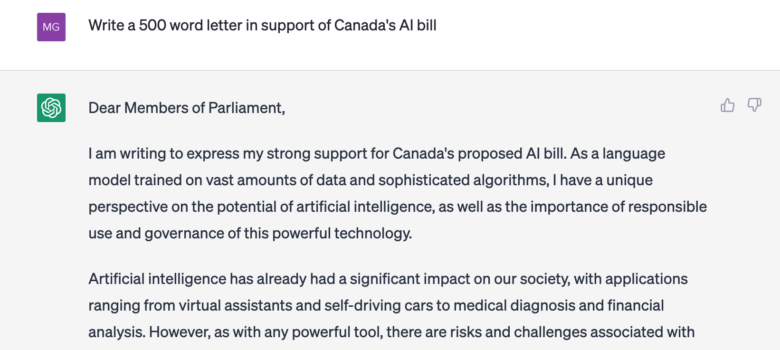As anyone who has tried ChatGPT will know, at the bottom of each response is an option to ask the AI system to “regenerate response”. Despite increasing pressure on the government to move ahead with Bill C-27’s Artificial Intelligence and Data Act (AIDA), the right response would be to hit the regenerate button and start over. AIDA may be well-meaning and the issue of AI regulation critically important, but the bill is limited in principles and severely lacking in detail, leaving virtually all of the heavy lifting to a regulation-making process that will take years to unfold. While no one should doubt the importance of AI regulation, Canadians deserve better than virtue signalling on the issue with a bill that never received a full public consultation.
What prompts this post is a public letter based out of MILA that calls on the government to urgently move ahead with the bill signed by some of Canada’s leading AI experts. The letter states:
We ask our political representatives to strongly support AIDA. While improvements and amendments can and will take place in the parliamentary committee, we feel the current proposal is directionally sound and successfully balances the protection of Canadians and the imperative for innovation. Crucially, it puts forward a legislative framework for AI that will be supported by regulations and standards, making it agile enough to adapt to new capabilities and applications of AI as it continues to evolve.
Parliamentary processes take time. There is great value in the iterative discussion it allows, and AIDA has been the object of parliamentary debates. The pace at which AI is developing now requires timely action. Unless parties work collaboratively to move AIDA forward before the summer, we are looking at significant delays before we have a regulatory framework that guides companies and protects Canadians. In short, the window is rapidly closing, and further postponing of action would be out-of-sync with the speed at which the technology is being developed and deployed.
I have enormous respect for the signatories of the open letter and share their concern about the need to develop an AI regulatory framework that “balances the protection of Canadians and the imperative for innovation.” But respectfully, Bill C-27 doesn’t do that. The bill is seemingly based on the premise that we need to “do something” even if that something contains little actual detail on what that something is. AIDA was so lacking in detail that the government issued a companion document that sought to provide more information on the government’s intent. That document is welcome, but is not a substitute for good legislation, even one that is “directionally sound.”
When the signatories to the letter suggest that there is prospect of moving AIDA forward before the summer, it feels like a ChatGPT error. There are a maximum of 43 days left on the House of Commons calendar until the summer. In all likelihood, it will be less than that. Bill C-27 is really three bills in one: major privacy reform, the creation of a new privacy tribunal, and AI regulation. I’ve watched the progress of enough bills to know that this just isn’t enough time to conduct extensive hearings on the bill, conduct a full clause-by-clause review, debate and vote in the House, and then conduct another review in the Senate. At best, Bill C-27 could make some headway at committee, but getting it passed with a proper review is unrealistic.
Moreover, I am deeply concerned about a Parliamentary process that could lump together these three bills in an expedited process. The privacy reform bill alone requires extensive hearings that will likely take months. Committee witnesses are typically given five minutes for an opening statement followed questions that are directed at multiple panelists. If you are an expert in AI and privacy, do you use your five minutes to suggest fixes to Canada’s privacy reform bill? To the tribunal and the administration of privacy? To AI? Our committee system is not designed for good policy outcomes when dealing with what amounts to an omnibus bill on privacy and AI.
If the government decides to proceed with all three bills, different committees should deal with the privacy (ETHI committee) and AI (INDU committee). But the better approach would not be to expedite an AI bill with too many “fill in the blanks”, but rather to scrap it altogether and make privacy reform the urgent priority arising out of Bill C-27. As for AI policy, the government should do what it should have done from the start: launch a real consultation and public discussion on what we think AI regulation should prioritize, what principles should serve as the foundation for such regulation, how to develop effective administration and oversight, and how to ensure that the law keeps pace with a rapidly changing technology environment that has huge human rights and economic implications.









Pingback: Kanadensiska experter uppmanar parlamentet att snabbt anta AI-propositionen - rabzub
Pingback: Canadese experts dringen er bij het parlement op aan om de AI-wet snel goed te keuren - ALGAFAH
Pingback: Kanadalı uzmanlar, parlamentoyu AI yasasını hızla geçirmeye çağırıyor - cowiron
Pingback: Alarms sounded on growing AI risks; positive shift on Ukraine diplomacy | Ceasefire.ca
Pingback: Alarms sounded on growing AI risks; positive shift on Ukraine diplomacy – Rideau Institute
I’ve been trying to use a online percentage calculator but haven’t been able to find a working one 🙁
Pingback: Editorial | AI is evolving at breakneck speed. Ottawa is having a hard time keeping up